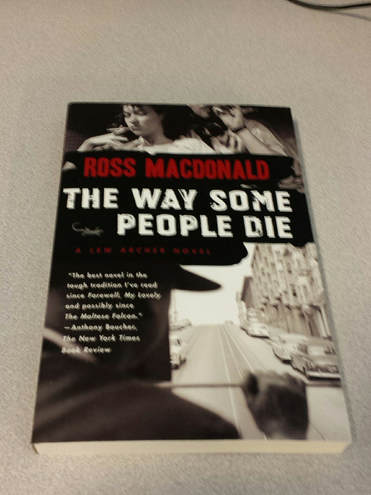Well.
For Christmas, I was given a large-denomination gift-card to a chain bookstore and while browsing it, I didn't find much I was interested in that day. Nothing against the store--far from it, I spend a lot of time and money there--I just wasn't feeling anything that caught my eye. I was about to leave until I saw a copy of THE WAY SOME PEOPLE DIE, the third Lew Archer novel (though I didn't know it at the time). Since I had a gift-card, I figured why not.
I wish I hadn't waited so long to check out MacDonald.
Read on below.
Firstly, the plot starts off simply: Archer is hired by a concerned mother who hasn't seen or spoken with her daughter in months, a daughter whom she describes as "man-crazy". It isn't just that she isn't contacting her mother, either; the girl has walked away from a good-paying job as a nurse and has even moved out of her apartment without leaving a forwarding address. She's understandably concerned, though Archer isn't - not at first, anyway.
Of course, it isn't as simple as that, either. Archer isn't the only one looking for the girl, who supposedly has a package everyone from mobsters to druggies to supposedly-legitimate businessmen want (yes, it's a MacDonald MacGuffin!), and it turns out that the girl isn't any damsel in distress. She's as hard-boiled as any of the other characters. As a detective story, the novel is quite complicated, but still manages to skirt the line between being too complicated and by the end, all the many twists and turns make sense. It's an impressive bit of plotting on MacDonald's part.
What sets this novel apart from simple Chandler pastiche, though, is MacDonald's ability to suffuse it with, and impart to the reader, the sense of world-weary sadness that these characters are steeped in. They are doing the things they do less because they want or even need to, but because it's simply something to stave off the malaise for a while. They're all damaged people and MacDonald makes a great case for even the monsters being human.
Take the mobster Dowser, for example: he's short, so short that even when he's lounging by the pool, he wears sandals with two-inch heels. And he's insecure. He hates being alone. After Archer's interview with him, he doesn't want to be alone; he asks Archer to stay with him, at least until one of his cronies returns. He doesn't say so in as many words, but it's pretty clear that he he can't stand being alone with his own thoughts. MacDonald makes him out to be a pitiful figure, despite the amount of money and power he has.
One of the greatest weaknesses of Chandler's Phillip Marlowe is that he's a barely a two-dimensional character: he's almost not even a part of the stories about him, he's simply the vehicle Chandler uses to steer us from character to character as we ride through each mystery. And that's fine, but Lew Archer is more than that. He's got a humanity--a wearied, beaten-down humanity, granted--that shows through as he feels for the people he interacts with, rather than simply observing them and their foibles. MacDonald makes it clear that Archer isn't a mystery-solving robot, but a human being who wishes this wasn't the way it has to be, but can't figure out a way to make it otherwise. And that makes a big difference in the reading experience.


 RSS Feed
RSS Feed